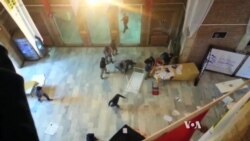Concerns are growing in Turkey of Islamic radicalization at some universities, after clashes between supporters of the jihadist group Islamic State (IS) or ISIS, and those opposed to the extremists. Pro-jihadist literature is on sale openly on the streets of Istanbul. Critics accuse the government of turning a blind eye to radicalism at home, while Kurds accuse the president of supporting IS - a charge strongly denied.
Wielding batons and wearing masks, a group of IS supporters attacked students at Istanbul University who were protesting against the extremist group last month.
Among the demonstrators attacked was Aysegul Korkut.
She says she and her friends prepared banners in the morning condemning the Islamic State group's barbarity in the Syrian border town of Kobani. In the afternoon, she says, the pro-IS gang came and told them, “You have 15 minutes to take down the banners. If not, we'll remove them ourselves.”
Students say the incident was the first in a series of fights at Istanbul University's Beyazit campus. Turkish media say dozens of people have been arrested.
Cosmopolitan Istanbul feels a long way from the frontlines in Syria and Iraq. But a few blocks from the university, the store Global Books specializes in jihadist literature. On sale are magazines and books bearing the face of, among others, the late al-Qaida leader Osama bin Laden.
The store’s owner Osman Akyildiz says university students are among his biggest customers.
He says that sales of this kind of book have been increasing both in his bookshop and in the Turkish publishing market since the war in Syria started.
Akyildiz had this justification for the material he sells:
“They are terrorists according to Western countries,” he said. “But for everyone the definition of terrorist is different. According to us, jihadists are heroes.”
If authorities do not tackle extremism at home, Turkey could face attacks on home soil, warns political analyst Ahmet Kasim Han of Kadir Has University in Istanbul.
“We should be worried, at least at the level of taking precautions and attending to the matter extremely carefully, because the spiral of radicalization is such that if you do fail to notice it, it would climb to extremes in a very short period of time,” said Kasin.
Hundreds of kilometers east, Turkish tanks are parked along the Syrian frontier. Ankara is refusing to join the fight against IS militants and is blocking Kurdish volunteers from crossing over to defend Kobani.
Kurdish separatists fought a decades-long insurgency against the Turkish state. Many Kurds accuse Ankara of tolerating, or even supporting, the IS group in the hope of striking a blow against the Kurdish separatists, a charge denied by the government.
Such a policy would backfire on Turkey, says Ibrahim Sirkeci of Regent's University London.
“If you see ISIS as a good thing happening to you because they try to defeat your enemy… that’s not the case, because ISIS is at the Turkish border, which has been quite a porous border for population movements," he said. "And, obviously, it is easy to trespass if you are a terrorist organization.”
Sirkeci says Turkey finds itself torn between competing forces - its partnerships with NATO and the West, its ambitions to be a dominant Middle East player, and turmoil at home. Critics warn that the country must not become fertile ground for extremists.





